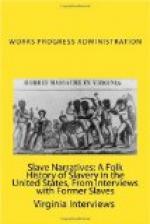3. What did the slaves do after the war? What did they receive generally? What do they think about the reconstruction period?
4. Did secret organizations such as the Ku Klux Klan exert or attempt to exert any influence over the lives of ex-slaves?
5. Did the ex-slaves ever vote? If so, under what circumstances? Did any of their friends ever hold political office? What do the ex-slaves think of the present restricted suffrage?
6. What have the ex-slaves been doing in the interim between 1864 and 1937? What jobs have they held (in detail)? How are they supported nowadays?
7. What do the ex-slaves think of the younger generation of Negroes and of present conditions?
8. Were there any instances of slave uprisings?
9. Were any of the ex-slaves in your community living in Virginia at the time of the Nat Turner rebellion? Do they remember anything about it?
10. What songs were there of the period?
The above sent to: Alabama, Arkansas, Florida, Ga., Kentucky, La., Md., Mississippi, Mo., N. Car., Okla., S. Car., Tenn., Texas, Virginia, W. Va., Ohio, Kansas, Indiana.
[Document 9]
MEMORANDUM
September 8, 1937
TO: STATE DIRECTORS OF THE FEDERAL WRITERS’
PROJECT
FROM: HENRY G. ALSBERG
It would be a good idea if you would ask such of your field workers as are collecting stories from ex-slaves to try to obtain stories given to the ex-slaves by their parents and grandparents. The workers should try to obtain information about family traditions and legends passed down from generation to generation. There should be a wealth of such material available.
We have found that the most reliable way to obtain information about the age of ex-slaves or the time certain events in their lives took place is to ask them to try to recollect some event of importance of known date and to use that as a point of reference. For instance, Virginia had a very famous snow storm called Cox’s Snow Storm which is listed in history books by date and which is well remembered by many ex-slaves. In Georgia and Alabama some ex-slaves remember the falling stars of the year 1883. An ex-slave will often remember his life story in relation to such events. Not only does it help the chronological accuracy of ex-slave stories to ask for dated happenings of this kind, but it often serves to show whether the story being told is real or imagined.
Sent the following states:
Alabama Maryland Tennessee
Arkansas Mississippi Texas
Florida Missouri Virginia
Georgia N. Carolina West Virginia
Kentucky Oklahoma Ohio
Louisiana S. Carolina Kansas
Indiana



